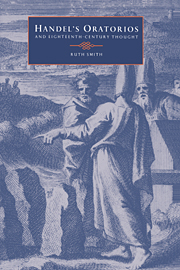Book contents
- Front Matter
- Contents
- Acknowledgements
- Abbreviations
- Introduction
- PART 1 ENGLISH ORIGINS OF ENGLISH ORATORIO
- PART II THE PATRIOT LIBRETTO FROM THE EXCISE BILL TO THE JEW BILL: ISRAELITE ORATORIOS AND ENGLISH POLITICS
- Chapter 8 Political events and political thought
- Chapter 9 Allegorical politics
- Chapter 10 Moral politics
- Chapter 11 ‘Esther’ to ‘Athalia’
- Chapter 12 In time of war
- Chapter 13 Images of government
- Chapter 14 The conflict of public and private interests
- Chapter 15 Coda: the end of Handel's Israelite oratorios
- Appendix I Libretto authors and sources
- Appendix 2 The oratorios and Methodism
- Notes
- Bibliography of sources cited
- Index
Chapter 15 - Coda: the end of Handel's Israelite oratorios
Published online by Cambridge University Press: 22 September 2009
- Front Matter
- Contents
- Acknowledgements
- Abbreviations
- Introduction
- PART 1 ENGLISH ORIGINS OF ENGLISH ORATORIO
- PART II THE PATRIOT LIBRETTO FROM THE EXCISE BILL TO THE JEW BILL: ISRAELITE ORATORIOS AND ENGLISH POLITICS
- Chapter 8 Political events and political thought
- Chapter 9 Allegorical politics
- Chapter 10 Moral politics
- Chapter 11 ‘Esther’ to ‘Athalia’
- Chapter 12 In time of war
- Chapter 13 Images of government
- Chapter 14 The conflict of public and private interests
- Chapter 15 Coda: the end of Handel's Israelite oratorios
- Appendix I Libretto authors and sources
- Appendix 2 The oratorios and Methodism
- Notes
- Bibliography of sources cited
- Index
Summary
Why did Handel produce no Israelite oratorio after Jephtha? The obvious answer is that he was growing blind and exhausted; yet this did not prevent the production, when his sight was completely extinguished, of a ‘new’ work. The Triumph of Time and Truth (1757) was a compilation (perhaps by a collaborator) of earlier compositions fitted to a text provided by Morell. The libretto and most of the music derived from Handel's Il trionfo del tempo, but for the public it was a new oratorio. Why did Morell and Handel choose a non-biblical text at this juncture? Morell had to fit new words to the music, and though some were ready made (the translation by George Oldmixon in the 1737 libretto of Il trionfo), he could have found Old Testament ones to adapt that would have done as well. That he was not averse to making up more texts from the Old Testament is evident from his doing so after Handel's death: his Nabal (1764) and Gideon (1769) are characteristic Israelite librettos, which he fitted to existing music by Handel. The collaborators had had much more success with their Israelite oratorios up to 1753 than with their one full-length oratorio on another theme (Theodora was a box-office disaster). If Handel was the one who resisted another Israelite topic, one must ask why, his health being (in view of The Triumph of Time and Truth) an insufficient reason. It is plausible that the reason was the 1753 Jew Bill furore.
- Type
- Chapter
- Information
- Handel's Oratorios and Eighteenth-Century Thought , pp. 346 - 350Publisher: Cambridge University PressPrint publication year: 1995

